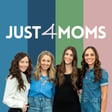
Breaking the Silence on Maternal Mental Health
In Episode 18 of Just 4 Moms, Caitlin and the crew are back with laughs, honesty, and a deep dive into a topic that impacts countless mothers—maternal mental health. They kick things off with a hilarious discussion about the lies we tell our kids (yes, stores do close at naptime), and a round of fresh “Mom Fails” that will have you nodding along in solidarity.
Then, in honor of Maternal Mental Health Month, the conversation takes a heartfelt turn as the hosts share their personal journeys through postpartum challenges—from anxiety and baby blues to the gaps in postpartum care. They’re joined by special guest Katie Crenshaw—author, speaker, and mental health advocate—who brings powerful insight into her own experience and her work with The Blue Dot Project. This episode is a must-listen for anyone who’s felt the weight of new motherhood and wondered if they were alone. Spoiler: you're not.
